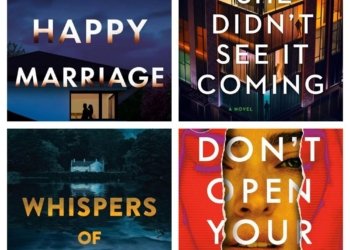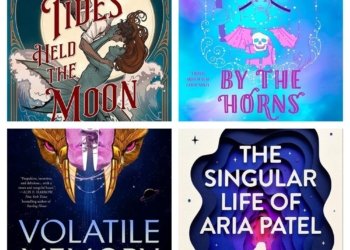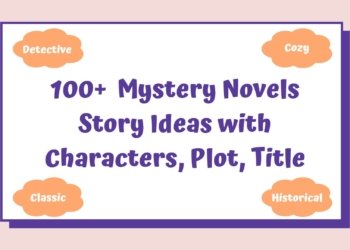No products in the cart.
A Conversation with Jessica A. McMinn, a Fantasy Author
Jessica A. McMinn made her indie author debut with The Ruptured Sky, the first book in the dark fantasy quartet, Gardens of War & Wasteland.
460
SHARES13.3k
VIEWSJessica A. McMinn is a grimdark fantasy author based in regional NSW, Australia. Since graduating from the University of Wollongong with Distinction in BCA (Creative Writing) and BA (Japanese), Jessica spent five years in Japan teaching English while refining her writing craft. She now works as a freelance writer and author.
In 2023, Jessica made her indie author debut with The Ruptured Sky, the first book in the dark fantasy quartet, Gardens of War & Wasteland. When not writing her dark and twisty novels, she likes to kick back with an audiobook and do some cross-stitch or jump on FFXIV to tank the floor. Mother to two small humans and a rather fat cat, Jessica lives on coffee and little sleep.
Let’s get started with a quick rapid fire.

Q1. If you could be transformed into one animal, which one would you choose?
A cat.
Q2. What time do you usually go to bed at night?
10:30pm.
Q3. Are you more of an introvert or an extrovert?
Introvert.
Q4. Who is your favorite Disney character?
Fa Mulan.
Q5. Would you rather travel to the past or to the future?
Past.
Q6. What is your last Google search?
“Waxing moon”.
Q7. What object do you misplace or lose the most?
My phone or my shoes.
Q8. What is the kindest thing someone ever did for you?
My sister bought me my first car.
Q9. Learn by watching or learn by doing?
A bit of both, but mostly doing. “Grief is a wound that must be bled. Let it fester and it infects you with rage. A lesson I learnt firsthand.”Jessica A. McMinn, The Ruptured Sky
Q10. Expensive presents or homemade presents?
Homemade!
Q11. What is one missed opportunity that you wish you could have a second chance at?
Becoming a proper, qualified English or primary school teacher.
Q12. What is not a big deal to most people but is torture to you?
Seeing people repeatedly flout the rules (and getting away with it).
It’s time for a more detailed conversation, Jessica.
You’ve answered our rapid fire brilliantly, Jessica. Now, it’s time for our readers to know more about the person behind the book.
Q. Tell us something about yourself that’s going to make us wonder more about you.
I never learnt to ride a bicycle. That really seems to make people go “what!?”
Q. Well, that will keep you in our thoughts. So, what books did you grow up reading?
I actually wouldn’t consider myself to have been a big reader growing up, ironically. I did have my favourites, though and I remember really enjoying Pony Pals and the Star Wars Jedi Apprentice books.
As I got older (into high school) I mostly read manga. Things like Naruto, Bleach, and works by CLAMP were popular at that time. I only really got back into reading novels that last ten years or so.

Q. Interesting. What, to you, are the most important elements of good writing?
Aside from the obvious answer of correct grammar and punctuation, I really value writing styles that have a good balance of description and vagueness. I find overly descriptive writing, particularly visual description, overwhelming and distracting. I like a bit of freedom to imagine things myself.
Basically, I find writers who can say a lot in a sentence or two to be far more impressive than those who can produce blocks of beautiful, poetic description.
Q. Do you hide any secrets in your books that only a few people will find?
None that come to mind, actually. I don’t really write characters or events inspired by people I know. There’s one name I have used to honour my Grandmother but aside from that, any secrets I’ve included have been done so subconsciously.
Q. Now comes the most anticipated question that every author must answer. How do you process and deal with negative book reviews?
Having undertaken a Creative Writing major at university I’ve had a lot of practice receiving and responding to negative critique. Of course it stings to hear criticism, but at the end of the day, everyone has different styles and tastes and one person’s yuck will ultimately be another’s yum.
Book reviews are mostly for readers, anyway, so I try not to take them to heart.
Q. What comes first for you — the plot or the characters — and why?
That’s a bit like the chicken or the egg for me. I think the vague concepts of a plot, setting and character all sort of develop around the same time. When it comes to fleshing the idea out, however, it’s definitely the character who comes to life first. Writing memorable, realistic characters is something that’s really important to me so I like focusing on them first before throwing a string of awful situations at them to see how they react and that more or less becomes the plot.
Q. How do you develop your plot and characters?
Mostly by accident, lol. I’m a discovery writer (which is basically nicer term for ‘pantser’) so I’m not one to sit down and write detailed character profiles or beat sheets or anything. I’ll have a vague outline (literally just dot points of what I want/think should happen in any given chapter) but it ultimately changes in the heat of the moment.
My characters really do have a mind of their own and as I’m writing I might discover that my previously assumed level-headed protagonist is actually quite the rash decision maker. The same thing happens with plot–I might suddenly write something that starts steering the story in another direction, or I’ll be hanging out in the couch watching TV or listening to an audio book when I randomly think “Wait, what if…” and then that becomes part of the story.
It’s all pretty spontaneous, really.
Q. What does literary success look like to you?
I used to think success was measured by critical acclaim and awards – that’s what four years of University does to you. Now I think it’s more being able to write fulltime to support my family or having strangers – no matter how few – tell me how much they loved my books. I think that’s the most important measure of success, isn’t it? Impacting someone’s life?
And well, money doesn’t hurt either, lol.

Q. Let’s talk about your book. Tell us about it. No major spoilers.
Urgh. I was dreading this question.
In a nutshell, The Ruptured Sky tells the story of a madman’s quest to restore the dead goddess and prevent the world from being enslaved by those who seek to take her place. He needs four “Chosen” warriors to unlock the seals on her soul but in doing so, will unleash a whole avalanche of problems onto the world.
Throughout the course of the story we meet reluctant heroes, grey heroes, queer heroes and a whole bunch of dark and twisty magic. The Ruptured Sky is my debut novel and also the first instalment of a gritty dark/grimdark fantasy quartet that fans of Robin Hobb, Anna Stephens and R.F Kuang are sure to enjoy!
It’s available for pre-order now with a release date of 4 April 2023.
Q. What part of the book did you have the hardest time writing?
The Ruptured Sky is told through four different POVs and two of these – Kriah and Kiokharen, especially – gave me a lot of grief. The former was because he was only added as POV character in later drafts, and so I didn’t have the same connection to him. And Kio was a struggle simply because I needed to rewrite him an entire new character arc after the first beta read so that was just a pain lol.
Q. Would you and your main character get along?
I’m not entirely sure, to be honest. In my daily life, I’m pretty much as Lawful Good as you can get, so I have no doubt the, uh, “grey” morals of all my characters would cause some friction and discomfort.
In regards to Amika specifically, we’d likely clash. Amika is painfully stubborn – almost to the point of being destructive – and she is gonna do what she wants and be damned with everyone else. Me, I’m more of a go with the flow, people pleaser kinda girl.
I’d probably get on with her brother, though.
Q. What are the essential characteristics of a hero you can root for?
I like to get behind an underdog. I like heroes who fail; I like to see them make mistakes and have to work extra hard to make things right again. To me, that’s what makes them relatable, even if they’re magical, sword-wielding demon slayers.
Q. Let’s talk about the process of writing. When you’re writing an emotional or difficult scene, how do you set the mood?
I just drink coffee, lol. “Fun” scene? Coffee. Action scene? Coffee. Torture scene? Coffee.
So, my writing process is essentially: drink coffee, write words. If I’m wired on enough caffeine I can (theoretically) power through a scene so fast I don’t even have to give it any thought.
I find the quicker I write, the more organic and raw the words seem to be. I don’t have time to overthink them and instead let myself just respond naturally to the moment. That’s what helps me create a strong, emotional impact, I think.
Q. What was your hardest scene to write?
Without giving too much away, there’s a torture section in the latter half of the book followed by a painful reunion. I really wanted to make sure both these sequences hit hard in the feels so I agonised over these chapters a lot. I certainly hope it’s paid off.
Q. It’s been fun. Now, before we wrap this up, do you have any suggestions to help me become a better writer? If so, what are they?
People often say that writing is a solo pursuit but it’s really not. You need a critique partner. Or two. Maybe even three. But at least one you really trust who understands your style and your vision.
Ideally, they’ll also regularly read and enjoy the genre you write in but even just having another set of eyes and a brain you can pick for ideas as you progress is helpful.
I know I’m a better writer for it.
UPDATE:- Her book, The Ruptured Sky will be available on Amazon starting April 04, 2023.
Related Posts
10 Most Anticipated Thriller Books of Summer 2025
Summer is just around the corner, and with it comes an exciting lineup of thrilling reads that will keep you...
8 Most Anticipated Science Fiction and Fantasy of Summer 2025
As summer 2025 approaches, the literary landscape is buzzing with excitement for an array of upcoming science fiction and fantasy...
8 Must Read Books of June 2025
As June 2025 approaches, the literary world is buzzing with excitement, and it’s the perfect time to dive into some...
100+ Mystery Story Ideas to overcome your writer’s block in June 2025 with Plot and Characters
Welcome to the ultimate playground for mystery writers! If you’ve ever found yourself staring at a blank page, desperate for...
About Us

Trenzle
Where Trends are made and discovered
Trenzle is your official source of discovering the latest people, work, and ideas that deserve to trend. Discover Authors and their books, Creators and their work, People and their opinions, and Stories from around the globe.
Learn more
Latest Posts
10 Most Anticipated Thriller Books of Summer 2025
July 10, 2025
Categories
© 2023 Trenzle - Online Author News & Magazine










